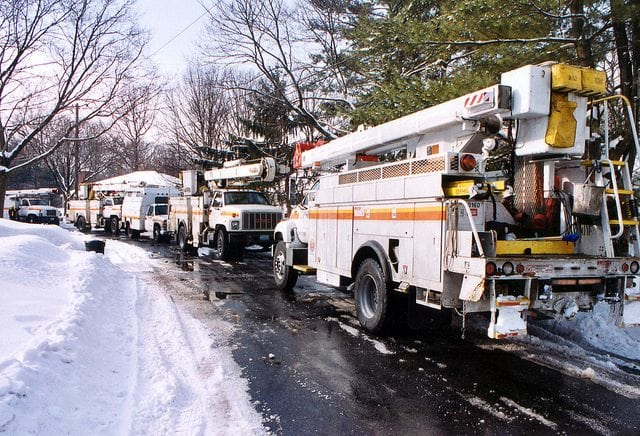
Learning from Superstorm Sandy: PSE&G Improves Infrastructure, Communications and Logistics
On Oct 28, 2014Superstorm Sandy was the most powerful and destructive storm in Public Service Electric and Gas Company’s 111-year history, causing more than 2 million PSE&G customers to lose power. In the two years since the storm, PSE&G, which serves nearly three-quarters of New Jersey’s population, continues to make significant improvements to its infrastructure, communications and logistics that will keep more customers in service during a storm, and restore service faster in the aftermath.
“During the two-week period following Sandy, we made more than 2 million electric service restorations — a record for any utility in the country,” said Ralph LaRossa, president and chief operating officer of PSE&G. “Nearly half of our outages were caused by switching and substations that flooded due to the storm surge. Water ranging from 4 to 8 feet inundated our facilities — including some that had never been submerged in all their years of operation.”
Before Sandy, PSE&G began rewiring its system, adding 69-kV lines for added capacity and reliability. That work continues. The new lines are being installed on stronger poles with better lightning protection, and fiber optic wires that improve communication between substations.
Improving Infrastructure
The transmission improvements are only the beginning. During the next three years, PSE&G’s $1.22 billion Energy Strong program will help the utility significantly strengthen and protect its electric and gas systems against severe weather damage.
As part of the Energy Strong program, PSE&G will protect, raise or relocate 29 switching and substations; replace and modernize 250 miles of gas mains in or near flood areas; create redundancy in the system; protect five natural gas metering stations and a liquefied natural gas station affected by Sandy or located in flood zones; and deploy smart grid technologies to better monitor system operations.
Work is currently under way in 28 municipalities to replace low-pressure cast iron gas mains, with high-pressure plastic pipes. “The new pipes and higher pressure will keep the water out and customers in service when it floods,” said LaRossa. “We expect to complete 88 miles of this work by the end of the year. On the electric side, extensive planning, engineering and procurement are under way to begin work on our switching and substations early next year.”
Smart grid projects underway include installing advanced technologies in PSE&G substations to facilitate full remote monitoring and control; and contingency restoration work that adds smart switches and fuses, and multiple sections on circuits. These upgrades ensure that when there is an outage, service will be restored faster and the outage will affect fewer customers.
Changing Communications Channels
In addition to improving infrastructure, PSE&G has made significant changes to better communicate with customers before, during and after storms. “We’ve ramped up our messaging across all channels, including Twitter and Facebook,” LaRossa said. “Our goal is to help customers understand what to expect from an event, how they can prepare and stay safe, and how they can best communicate with PSE&G.”
New communication tools include MyAlerts, which allows customers to opt in for text messages, as well as email notifications about outages in their area and service restoration; and an enhanced Outage Map that provides customers with detailed information about power outages in their neighborhood and across PSE&G’s service territory.
More Training, Better Logistics
Internal communications, emergency training and logistics are critical to storm preparedness. Located at the company’s headquarters in Newark is its Delivery Emergency Response Center (DERC), which is activated to oversee multiple operations in the field when preparing for and responding to a major storm. People representing all functions across the company staff DERC 24/7 — getting the right people, to the right places, with the right equipment at the right time.
PSE&G conducts extensive storm outage planning, training and exercises throughout the year. So far this year, its employees have completed more than 1,700 emergency preparedness and response training sessions, logging nearly 4,000 hours of training. Training in safety and damage assessment equips PSE&G office employees to help in the field during emergencies.
Since Sandy, process improvement teams have studied more efficient ways to undertake restoration activities, and PSE&G has expanded its network of mutual aid from eight to 22 utilities. “The utility industry is somewhat unique in that we all help each other,” said LaRossa. “During Sandy, we brought in 4,500 contractors from 24 states and Canada to help restore service.”
To accommodate the massive influx of people and equipment during Sandy, PSE&G set up 12 staging areas across the state. Since then, the company has identified 22 staging areas and has specific site plans and role assignments for each of these “pop-up utility cities” where material and equipment is stored and trucks can be fueled.
“From 2010 to 2012, we experienced the four most destructive storms in our history. We learned a lot,” said LaRossa. “We hope to never see the likes of Sandy again, but feel confident that our infrastructure investments, comprehensive communications tools and emergency response training will ensure that our customers, employees and systems are better ready to weather severe storms in the future.”
Related Articles:





